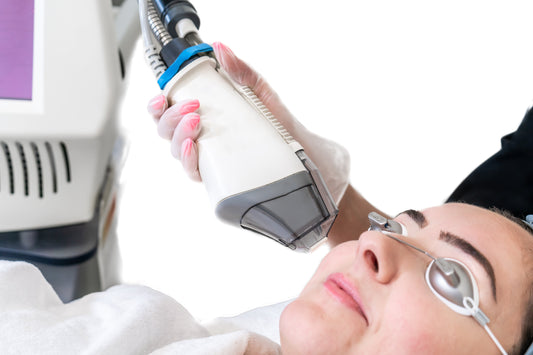Anyone looking to achieve and maintain a radiant, supple, and youthful complexion needs to consider adding vitamin C and hyaluronic acid to their routine. Together, these science-backed ingredients (which are both suitable for all skin types) enhance the look and feel of the complexion while protecting the skin against environmental stressors. Here’s why and how you can incorporate this dynamic duo into your regular skincare regime.
What Do Vitamin C & Hyaluronic Acid Do For Your Skin?
Hyaluronic acid and vitamin C are both multi-tasking ingredients that work in different ways to support the skin. Let’s go over the individual merits of each of these ingredients.
Vitamin C
There’s a laundry list of reasons why you should be using topical vitamin C for skin. First and foremost, vitamin C is an antioxidant that defends the skin against damaging free radicals from UV rays, pollutants, and other environmental aggressors.1 Free radicals can contribute to visible signs of aging, including fine lines, wrinkles, loss of firmness, and dark spots.
The anti-aging effects of vitamin C don’t stop there. When applied topically, this vitamin encourages the production of collagen, the protein that provides structure and strength to the skin.2 The body’s natural production of collagen decreases as we age, so vitamin C can help bolster that production cycle to keep the complexion looking youthful.
Vitamin C can also help those dealing with hyperpigmentation or general dullness. It blocks melanin production, and is able to brighten the complexion and fade the appearance of discoloration for a more even skin tone.3
The dermatologist formulated Foundation Skincare Vitamin C Lotion is made with a potent 20% concentration of vitamin C — one of the highest available — to ensure the skin gets the maximum benefits of this ingredient. The formula also features vitamin E to boost the effectiveness of the vitamin C and to provide additional antioxidant support. These ingredients are formulated in a lotion base that effectively moisturizes the skin.
Vitamin C Lotion 20%
• Increased collagen production renews skin
• Antioxidant power repairs discoloration
Hyaluronic Acid
Hyaluronic acid’s strengths come from its ability to hydrate the skin. This molecule is a humectant that is able to hold approximately 1,000 times its weight in water. It attracts moisture to the skin and locks it in, improving hydration levels and boosting the skin’s ability to retain moisture for a softer, healthier, and more comfortable complexion.4
Beyond enhancing the skin’s hydration, there are other benefits of using hyaluronic acid for skin. By plumping the skin with moisture, hyaluronic acid can help soften the signs of aging.5 It may help with firmness while also making fine lines and wrinkles less prominent. This ingredient has also been found to promote faster wound repair, thanks to its ability to minimize inflammation and encourage tissue regeneration.6
The Foundation Skincare Hyaluronic Acid Lotion is the perfect solution for anyone looking to give their complexion a daily dose of hydration. The gentle lotion is suitable for all skin types, and can be easily layered with other skincare products (like the Vitamin C Lotion). It’s also a product that can be used not only on the face and neck, but anywhere else that needs more hydration, like the chest, back of hands.
Benefits Of Using Them Together
Hyaluronic acid and vitamin C complement each other’s effects. These ingredients address a host of skin concerns from different angles, helping to both minimize and prevent signs of aging, brighten the complexion, fade discoloration, and improve moisture levels. When regularly used in tandem, these ingredients encourage a plump, youthful, and glowing complexion.
Incorporating Them Into Your Skincare Regime
These two ingredients can both be used twice a day for maximum results, and can be layered with one another. If you have sensitive skin or are using a retinoid cream at night, it is recommended to use vitamin C once a day in your morning routine. Hyaluronic acid is gentle and can be added to your routine any time your skin needs some hydration. It layers well over other skincare products.
As always, be sure to use sunscreen as the very last step in your morning routine. With consistent use, these expertly formulated lotions can help you achieve and maintain healthy, radiant skin.
References:
-
https://www.ncbi.nlm.nih.gov/pmc/articles/PMC3673383
-
https://www.ncbi.nlm.nih.gov/pmc/articles/PMC5579659
-
https://www.ncbi.nlm.nih.gov/pmc/articles/PMC7802860
-
https://pubmed.ncbi.nlm.nih.gov/34176098
-
https://www.ncbi.nlm.nih.gov/pmc/articles/PMC3970829
-
https://www.hmpgloballearningnetwork.com/site/wounds/article/hyaluronic-acid-inflammation-and-tissue-regeneration





